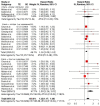Prognostic Factors in Patients with Breast Cancer Liver Metastases Undergoing Liver Resection: Systematic Review and Meta-Analysis
- PMID: 35406462
- PMCID: PMC8997076
- DOI: 10.3390/cancers14071691
Prognostic Factors in Patients with Breast Cancer Liver Metastases Undergoing Liver Resection: Systematic Review and Meta-Analysis
Abstract
Background: The role of surgical resection of liver metastases in patients with breast cancer liver metastasis (BCLM) remains controversial. A systematic review and meta-analysis of prognostic factors related to survival after BCLM resection was performed.
Methods: An electronic search of relevant publications was performed. Pooled outcome measures were expressed as hazard ratios (HRs), including 95% confidence interval values (95% CIs), and calculated through a random-effects model. Heterogeneity was tested through the I2 index.
Results: Thirty-five publications reported analyses on prognostic factors and survival. A total of 2782 patients who underwent liver resection for BCLM were included. Positive axillary lymph nodes at breast cancer diagnosis were an unfavorable survival factor (HR 1.74, 95% CI 1.25 to 2.41, I2 = 0%). Cumulative predictive factor HRs (multiple liver metastases, size of the metastases, short interval between primary tumor and onset of liver disease) related to the BCLM pattern were 1.32 (95% CI 1.17 to 1.48, I2 = 71%) and 1.51 (95% CI 1.15 to 1.98, I2 = 76%) for surgical and pathological features (resection margin and presence of extrahepatic disease), respectively.
Conclusion: Resection of BCLM may provide a survival benefit for selected patients. For better long-term results, surgical selection should consider both primary tumor and BCLM features such as negative axillary lymph nodes at breast resection, a single hepatic lesion, a time longer than 24 months between breast and hepatic diagnosis, and a realizable R0 liver resection. However, the high heterogeneity among studies suggests the need for an RCT to validate the present findings.
Keywords: breast cancer; hepatic resection; liver metastases; meta-analysis; prognostic factors.
Conflict of interest statement
The authors declare no conflict of interest.
Figures






References
-
- Crump M., Gluck S., Tu D., Stewart D., Levine M., Kirkbride P., Dancey J., O’Reilly S., Shore T., Couban S., et al. Randomized Trial of High-Dose Chemotherapy with Autologous Peripheral-Blood Stem-Cell Support Compared with Standard-Dose Chemotherapy in Women with Metastatic Breast Cancer: NCIC MA.16. J. Clin. Oncol. 2008;26:37–43. doi: 10.1200/JCO.2007.11.8851. - DOI - PubMed
-
- Kobryń E., Kobryn K., Wroblewski T., Kobryń K., Pietrzak R., Rykowski P., Ziarkiewicz-Wróblewska B., Lamparski K., Zieniewicz K., Patkowski W., et al. Is there a rationale for aggressive breast cancer liver metastases resections in Polish female patients? Analysis of overall survival following hepatic resection at a single centre in Poland. Ann. Agric. Environ. Med. 2016;23:683–687. doi: 10.5604/12321966.1226866. - DOI - PubMed
-
- Vertriest C., Berardi G., Tomassini F., Broucke R.V., Depypere H., Cocquyt V., Denys H., Van Belle S., Troisi R.I. Resection of Single Metachronous Liver Metastases from Breast Cancer Stage I-II Yield Excellent Overall and Disease-Free Survival. Single Center Experience and Review of the Literature. Dig. Surg. 2015;32:52–59. doi: 10.1159/000375132. - DOI - PubMed
Publication types
LinkOut - more resources
Full Text Sources

